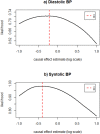Cardiometabolic risks of SARS-CoV-2 hospitalization using Mendelian Randomization
- PMID: 33846372
- PMCID: PMC8042041
- DOI: 10.1038/s41598-021-86757-3
Cardiometabolic risks of SARS-CoV-2 hospitalization using Mendelian Randomization
Abstract
Many cardiometabolic conditions have demonstrated associative evidence with COVID-19 hospitalization risk. However, the observational designs of the studies in which these associations are observed preclude causal inferences of hospitalization risk. Mendelian Randomization (MR) is an alternative risk estimation method more robust to these limitations that allows for causal inferences. We applied four MR methods (MRMix, IMRP, IVW, MREgger) to publicly available GWAS summary statistics from European (COVID-19 GWAS n = 2956) and multi-ethnic populations (COVID-19 GWAS n = 10,908) to better understand extant causal associations between Type II Diabetes (GWAS n = 659,316), BMI (n = 681,275), diastolic and systolic blood pressure, and pulse pressure (n = 757,601 for each) and COVID-19 hospitalization risk across populations. Although no significant causal effect evidence was observed, our data suggested a trend of increasing hospitalization risk for Type II diabetes (IMRP OR, 95% CI 1.67, 0.96-2.92) and pulse pressure (OR, 95% CI 1.27, 0.97-1.66) in the multi-ethnic sample. Type II diabetes and Pulse pressure demonstrates a potential causal association with COVID-19 hospitalization risk, the proper treatment of which may work to reduce the risk of a severe COVID-19 illness requiring hospitalization. However, GWAS of COVID-19 with large sample size is warranted to confirm the causality.
Conflict of interest statement
The authors declare no competing interests.
Figures



Similar articles
-
Biomarkers Associated With Severe COVID-19 Among Populations With High Cardiometabolic Risk: A 2-Sample Mendelian Randomization Study.JAMA Netw Open. 2023 Jul 3;6(7):e2325914. doi: 10.1001/jamanetworkopen.2023.25914. JAMA Netw Open. 2023. PMID: 37498601 Free PMC article.
-
Cardiometabolic risk factors for COVID-19 susceptibility and severity: A Mendelian randomization analysis.PLoS Med. 2021 Mar 4;18(3):e1003553. doi: 10.1371/journal.pmed.1003553. eCollection 2021 Mar. PLoS Med. 2021. PMID: 33661905 Free PMC article.
-
Mendelian randomization study of obesity and type 2 diabetes in hospitalized COVID-19 patients.Metabolism. 2022 Apr;129:155156. doi: 10.1016/j.metabol.2022.155156. Epub 2022 Jan 29. Metabolism. 2022. PMID: 35101533 Free PMC article.
-
The causal relationship between COVID-19 and seventeen common digestive diseases: a two-sample, multivariable Mendelian randomization study.Hum Genomics. 2023 Sep 26;17(1):87. doi: 10.1186/s40246-023-00536-x. Hum Genomics. 2023. PMID: 37752570 Free PMC article.
-
Using genetic variants to evaluate the causal effect of serum vitamin D concentration on COVID-19 susceptibility, severity and hospitalization traits: a Mendelian randomization study.J Transl Med. 2021 Jul 10;19(1):300. doi: 10.1186/s12967-021-02973-5. J Transl Med. 2021. PMID: 34246301 Free PMC article.
Cited by
-
Visceral adipose tissue and risk of COVID-19 susceptibility, hospitalization, and severity: A Mendelian randomization study.Front Public Health. 2022 Oct 21;10:1023935. doi: 10.3389/fpubh.2022.1023935. eCollection 2022. Front Public Health. 2022. PMID: 36339142 Free PMC article.
-
A framework for assessing selection and misclassification bias in mendelian randomisation studies: an illustrative example between body mass index and covid-19.BMJ. 2023 Jun 19;381:e072148. doi: 10.1136/bmj-2022-072148. BMJ. 2023. PMID: 37336561 Free PMC article.
-
Causal associations between body fat accumulation and COVID-19 severity: A Mendelian randomization study.Front Endocrinol (Lausanne). 2022 Aug 3;13:899625. doi: 10.3389/fendo.2022.899625. eCollection 2022. Front Endocrinol (Lausanne). 2022. PMID: 35992131 Free PMC article.
-
Estimating causal effects of genetically predicted type 2 diabetes on COVID-19 in the East Asian population.Front Endocrinol (Lausanne). 2022 Dec 7;13:1014882. doi: 10.3389/fendo.2022.1014882. eCollection 2022. Front Endocrinol (Lausanne). 2022. PMID: 36568068 Free PMC article.
-
Identifying factors contributing to increased susceptibility to COVID-19 risk: a systematic review of Mendelian randomization studies.Int J Epidemiol. 2022 Aug 10;51(4):1088-1105. doi: 10.1093/ije/dyac076. Int J Epidemiol. 2022. PMID: 35445260 Free PMC article.
References
-
- World Health Organization. Coronavirus Disease (COVID-19) pandemic. https://www.who.int/emergencies/diseases/novel-coronavirus-2019 (2020).
Publication types
MeSH terms
Grants and funding
LinkOut - more resources
Full Text Sources
Other Literature Sources
Medical
Miscellaneous

